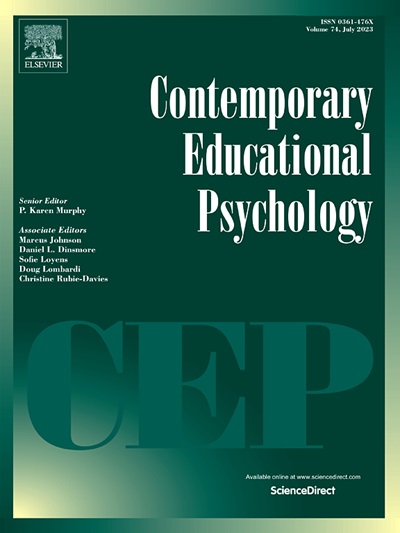Parent math anxiety and children’s math success: The role of autonomy-supportive and controlling parenting behaviors
IF 3.8
1区 心理学
Q1 PSYCHOLOGY, EDUCATIONAL
引用次数: 0
Abstract
Existing research highlights that parents’ math anxiety is a predictor of children’s math achievement and math anxiety. However, more research is needed to understand how this transmission occurs. This study examined the transmission of parents’ math anxiety to children’s math achievement and math anxiety via autonomy-supportive and controlling parenting behaviors using an observational coding scheme during a homework help task. The sample of 175 parent–child dyads was followed longitudinally from when children were in second grade (Mage = 8.02) to third grade (Mage = 9.18). Results indicated that higher levels of parents’ math anxiety were associated with more controlling parenting behaviors during the homework help task. Autonomy-supportive parenting behaviors were uniquely associated with higher math achievement in children one year later, whereas controlling parenting behaviors were associated with lower math achievement. Further, parents’ own math achievement was positively associated with autonomy-supportive parenting behaviors and children’s math achievement. However, neither parents’ math anxiety, math achievement, nor parenting behaviors were significantly associated with children’s math anxiety a year later. Overall, this study underscores the importance of parents’ math anxiety and math achievement for their parenting behaviors and demonstrates that controlling parenting behaviors can undermine children’s math achievement.
父母数学焦虑与儿童数学成功:自主支持和控制父母行为的作用
现有研究强调,父母的数学焦虑是孩子数学成绩和数学焦虑的预测因子。然而,需要更多的研究来了解这种传播是如何发生的。本研究采用观察性编码方案,通过自主支持和控制性父母行为,考察了父母数学焦虑对儿童数学成绩和数学焦虑的传递。175对亲子对从二年级(Mage = 8.02)到三年级(Mage = 9.18)进行纵向跟踪。结果表明,在家庭作业帮助任务中,父母的数学焦虑水平越高,父母的控制行为越强。自主支持型父母行为与孩子一年后数学成绩的提高有独特的联系,而控制型父母行为与孩子一年后数学成绩的降低有独特的联系。此外,父母自己的数学成绩与自主支持父母行为和孩子的数学成绩呈正相关。然而,一年后,父母的数学焦虑、数学成绩和父母的行为与孩子的数学焦虑都没有显著的联系。总体而言,本研究强调了父母的数学焦虑和数学成绩对其父母行为的重要性,并表明控制父母行为会破坏儿童的数学成绩。
本文章由计算机程序翻译,如有差异,请以英文原文为准。
求助全文
约1分钟内获得全文
求助全文
来源期刊

Contemporary Educational Psychology
PSYCHOLOGY, EDUCATIONAL-
CiteScore
16.50
自引率
3.90%
发文量
74
期刊介绍:
Contemporary Educational Psychology is a scholarly journal that publishes empirical research from various parts of the world. The research aims to substantially advance, extend, or re-envision the ongoing discourse in educational psychology research and practice. To be considered for publication, manuscripts must be well-grounded in a comprehensive theoretical and empirical framework. This framework should raise critical and timely questions that educational psychology currently faces. Additionally, the questions asked should be closely related to the chosen methodological approach, and the authors should provide actionable implications for education research and practice. The journal seeks to publish manuscripts that offer cutting-edge theoretical and methodological perspectives on critical and timely education questions.
The journal is abstracted and indexed in various databases, including Contents Pages in Education, Australian Educational Index, Current Contents, EBSCOhost, Education Index, ERA, PsycINFO, Sociology of Education Abstracts, PubMed/Medline, BIOSIS Previews, and others.
 求助内容:
求助内容: 应助结果提醒方式:
应助结果提醒方式:


